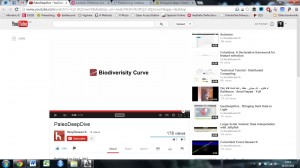Last year, a throng of palaeoecologists from the world around descended into Oxford to discuss what the 50 most pressing questions in palaeoecology are. I was happy to see some great scientists and communicators among them, including Anson Mackay, Jacquelyn Gill, and Gavin Simpson, which gives me real hope that these questions were crafted with more than just ‘science for the sake of science’ in mind, and I think this really shines through in their article.
Diving too deep?
A new initiative has just been announced that could help to revolutionise palaeontology. PaleoDeepDive is essentially an automated version of the Paleobiology Database, which is an online, professionally crowd-sourced and curated database of fossil occurrences pulled from the literature.
They have a launch video here:
I have a couple of reservations about this. Firstly, how do they expect to mine data from articles that are mostly still locked behind paywalls, at least legally.
I’m also a little concerned about the precision of their algorithms. Towards the end, they mention that in a sample of 500 articles, they get 15000 species names, whereas the PaleobioDB only picks up 1100. Well, in the latter, these names are occurrences – explicit records of fossils in time and space. What these 15000 represent is not clear – are they just those that are mentioned in the text, and therefore don’t really have any use, or are all the palaeontologists really just missing out on 90% of the data when extracting manually?
Additionally, I am concerned about the linking of metadata, such as the location and age of fossils, as well as data about the geology, environment of deposition, taphonomy etc. All of this information has to be sifted out of articles from within a host of information in articles when extraction is manual. I’m not sure if a machine will be able to distinguish between, for example, geological dates from something related, but not directly the age of the fossil, in text.
Anyway, these are just preliminary thoughts, and am sure that they have crossed the developers’ minds at some point, I look forward to seeing how this progresses, and undermines a lot of my work! 😉
Also, I’d love to hear any thoughts or comments you have about it!
That’s no cloud..
Science is a deadly serious subject. Well, actually, no it’s not. In the slightest. Scientists are actually pretty fun people, despite their common depictions, and sometimes they have been known to publish smile-inducing articles.
Take one Radagast the Brown of Bristol University (UK). This may or may not be a pseudonym, but either way he’s published a cool paper late last year on the climate of Middle Earth. It’s free to access here, and well worth a look. Not only is it a fun read, but also shows how fantasy and science can cross over some times, and possibly help to reach new audiences by conveying aspects of science in novel ways. I don’t want to give any of the results away, so if you’re into you hobbitses, elvses, and general circulation models, then it’s well worth a read!
Your poop or mine?
Back in the Mesozoic, lavatories probably didn’t exist. In fact, dinosaurs and other animals were probably pretty poorly mannered and just pooped wherever they felt like. But what or who cleaned up after them? In modern biomes, poop is decomposed by insects and bacteria of all breeds, and actually forms quite an important part of energy flow within ecosystems. But was it the same million of years ago during the reign of the dinosaurs?
Imagine a natural world without decomposers. Carcasses would litter landscapes, and there’d be a neat smattering of faeces decorating everything like jam. Humans have adapted beyond this need for decomposers by creating the loo – dinosaurs weren’t so technologically efficient, and one can only imagine the issues T. rex would have trying to flush anyway.


